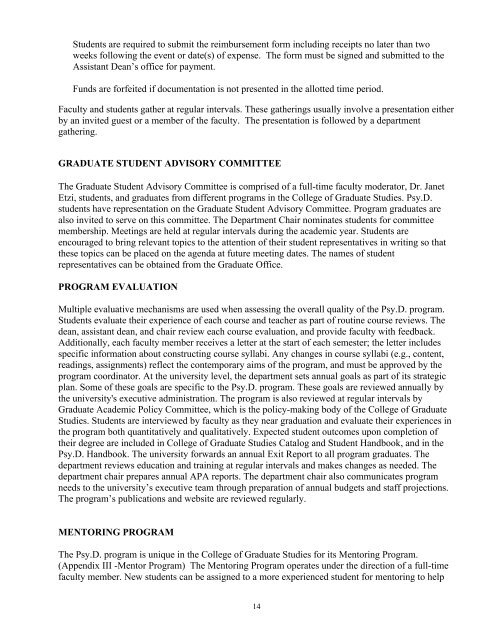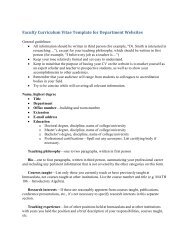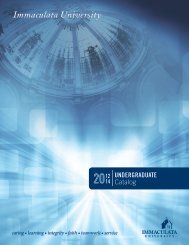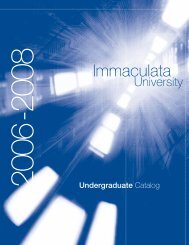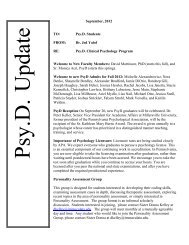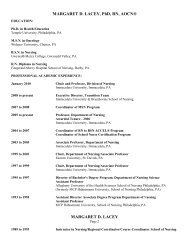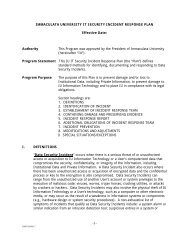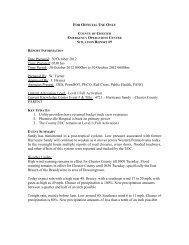Psy.D. Handbook Doctor of Psychology Program in Clinical ...
Psy.D. Handbook Doctor of Psychology Program in Clinical ...
Psy.D. Handbook Doctor of Psychology Program in Clinical ...
Create successful ePaper yourself
Turn your PDF publications into a flip-book with our unique Google optimized e-Paper software.
Students are required to submit the reimbursement form <strong>in</strong>clud<strong>in</strong>g receipts no later than two<br />
weeks follow<strong>in</strong>g the event or date(s) <strong>of</strong> expense. The form must be signed and submitted to the<br />
Assistant Dean’s <strong>of</strong>fice for payment.<br />
Funds are forfeited if documentation is not presented <strong>in</strong> the allotted time period.<br />
Faculty and students gather at regular <strong>in</strong>tervals. These gather<strong>in</strong>gs usually <strong>in</strong>volve a presentation either<br />
by an <strong>in</strong>vited guest or a member <strong>of</strong> the faculty. The presentation is followed by a department<br />
gather<strong>in</strong>g.<br />
GRADUATE STUDENT ADVISORY COMMITTEE<br />
The Graduate Student Advisory Committee is comprised <strong>of</strong> a full-time faculty moderator, Dr. Janet<br />
Etzi, students, and graduates from different programs <strong>in</strong> the College <strong>of</strong> Graduate Studies. <strong>Psy</strong>.D.<br />
students have representation on the Graduate Student Advisory Committee. <strong>Program</strong> graduates are<br />
also <strong>in</strong>vited to serve on this committee. The Department Chair nom<strong>in</strong>ates students for committee<br />
membership. Meet<strong>in</strong>gs are held at regular <strong>in</strong>tervals dur<strong>in</strong>g the academic year. Students are<br />
encouraged to br<strong>in</strong>g relevant topics to the attention <strong>of</strong> their student representatives <strong>in</strong> writ<strong>in</strong>g so that<br />
these topics can be placed on the agenda at future meet<strong>in</strong>g dates. The names <strong>of</strong> student<br />
representatives can be obta<strong>in</strong>ed from the Graduate Office.<br />
PROGRAM EVALUATION<br />
Multiple evaluative mechanisms are used when assess<strong>in</strong>g the overall quality <strong>of</strong> the <strong>Psy</strong>.D. program.<br />
Students evaluate their experience <strong>of</strong> each course and teacher as part <strong>of</strong> rout<strong>in</strong>e course reviews. The<br />
dean, assistant dean, and chair review each course evaluation, and provide faculty with feedback.<br />
Additionally, each faculty member receives a letter at the start <strong>of</strong> each semester; the letter <strong>in</strong>cludes<br />
specific <strong>in</strong>formation about construct<strong>in</strong>g course syllabi. Any changes <strong>in</strong> course syllabi (e.g., content,<br />
read<strong>in</strong>gs, assignments) reflect the contemporary aims <strong>of</strong> the program, and must be approved by the<br />
program coord<strong>in</strong>ator. At the university level, the department sets annual goals as part <strong>of</strong> its strategic<br />
plan. Some <strong>of</strong> these goals are specific to the <strong>Psy</strong>.D. program. These goals are reviewed annually by<br />
the university's executive adm<strong>in</strong>istration. The program is also reviewed at regular <strong>in</strong>tervals by<br />
Graduate Academic Policy Committee, which is the policy-mak<strong>in</strong>g body <strong>of</strong> the College <strong>of</strong> Graduate<br />
Studies. Students are <strong>in</strong>terviewed by faculty as they near graduation and evaluate their experiences <strong>in</strong><br />
the program both quantitatively and qualitatively. Expected student outcomes upon completion <strong>of</strong><br />
their degree are <strong>in</strong>cluded <strong>in</strong> College <strong>of</strong> Graduate Studies Catalog and Student <strong>Handbook</strong>, and <strong>in</strong> the<br />
<strong>Psy</strong>.D. <strong>Handbook</strong>. The university forwards an annual Exit Report to all program graduates. The<br />
department reviews education and tra<strong>in</strong><strong>in</strong>g at regular <strong>in</strong>tervals and makes changes as needed. The<br />
department chair prepares annual APA reports. The department chair also communicates program<br />
needs to the university’s executive team through preparation <strong>of</strong> annual budgets and staff projections.<br />
The program’s publications and website are reviewed regularly.<br />
MENTORING PROGRAM<br />
The <strong>Psy</strong>.D. program is unique <strong>in</strong> the College <strong>of</strong> Graduate Studies for its Mentor<strong>in</strong>g <strong>Program</strong>.<br />
(Appendix III -Mentor <strong>Program</strong>) The Mentor<strong>in</strong>g <strong>Program</strong> operates under the direction <strong>of</strong> a full-time<br />
faculty member. New students can be assigned to a more experienced student for mentor<strong>in</strong>g to help<br />
14


